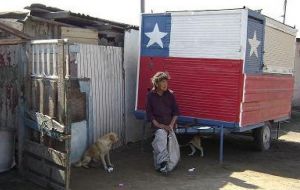MercoPress. South Atlantic News Agency
Two and a half million Chileans live below the poverty line
 The release of the poverty figures triggered a political dispute between the government and the previous administration of Michelle Bachelet
The release of the poverty figures triggered a political dispute between the government and the previous administration of Michelle Bachelet The numbers are startling: two and a half million Chileans are currently living below the poverty line, according to a new study by the Caracterización Socioeconómica Nacional (CASEN) 2009.
Approximately 3.7% of the population can be classified as indigent, or living in absolute poverty—without enough resources to meet basic human needs.
The study, which did not cover the effects of the devastating Feb. 27 earthquake, demonstrated a 1.4% increase in the nation’s poverty rate, from 13.7% in 2006 to 15.1% in 2009. It is the first time that the poverty rate has gone up since the Planning Ministry (MIDEPLAN) began monitoring it in 1987.
Chile fell from its first place ranking as the country with the lowest poverty rate in Latin America, a position that it held in 2006. Chile now ranks behind Uruguay, which counts 13.7% of its population living in poverty.
The statistics demonstrated variation by region, sector, and gender. The poverty rate was highest in La Araucanía and lowest in Antofogasta. Urban poverty levels were at 15.5%, while the figure was at 12.9% in rural areas. The study also showed that poverty has a disproportionate impact on Chilean women, with 15.7% of women compared to 14.5% of men. Moreover, 43.2% of poor household are families headed by women, who earn on average 30% less than their male counterparts.
The dissolution of families was one of the reasons offered by President Sebastián Piñera and others for the rise in poverty levels in the past four years.
María Paz Lagos Deputy Secretary of Chile’s national service of women said that when a couple separates the family experiences a reduction in resources. In theory, if a divorced couple’s children remain with the mother, the father is supposed to help support the family financially, but the large number of court proceedings concerning alimony payments suggests that many Chilean fathers are not following through with their obligations.
In response to the results of the study, Piñera also said he thought the current trend could be reversed in the next four years. He plans to send Congress a proposal for the creation of a Ministry of Social Development, which would coordinate policymakers to help eradicate poverty.
Piñera pointed to promoting 6% annual growth, creating 200,000 new jobs, improving education quality, strengthening families, and making social spending more efficient as means by which his government would seek to combat rising poverty.
When discussing the study’s findings, Piñera did not mention former president Michelle Bachelet specifically, but frequently referred to the need to make social spending more “focused” and “efficient,” a perceived jab at Bachelet’s administration. “We all know,” said Piñera, “that often-times resources do not reach those who really need them. Or often they get bogged down in government bureaucracy, or wasted on unnecessary expenditures, or simply lost to corruption”.
Government spokeswoman Ena von Baer, added “The government’s only interest is to correct the errors of the past in order to prevent more Chileans from falling into poverty. And yet the Concertacion seems more interested in defending itself than collaborating with us [Alianza] in this work”.
Amidst such criticism from the centre-right, members have the political opposition have been quick to put the survey results in the context of the worldwide economic recession of 2008-2009. Paula Quintana, who served as Planning Minister under Bachelet, said that “the principal reason for the rise in poverty rate is the worldwide economic crisis, which produced a significant rise in the price of goods, affecting those in the lowest income bracket, who are most vulnerable”.
However, Quintana emphasized that, “thanks to important social safety nets, it was possible to contain the situation and assist those Chileans that were suffering directly from the crisis.”
Ricardo French-Davis, an economist from the University of Chile, agreed with Quintana’s assessment, saying, “The rise in poverty was to be expected, given that Chile suffered from the effects of the world crisis and its impact on employment.”
Members of political parties have already traded barbs over the CASEN study’s repercussions. Concertación deputies have denounced the Piñera government for placing blame on Bachelet and using the poverty figures as political leverage. Christian Democrat Senator Andrés Zaldívar said, “If the president is trying to derive political dividends from this issue, he is making a serious mistake.”
Unlike Piñera, many right-wing leaders made no apologies about personally targeting Bachelet. “The former president should acknowledge a mea culpa for throwing away money that should have gone to Chile’s poor,” said Carlos Larraín, president of the National Renovation Party.
By Adrienne Lee – Santiago Times




Top Comments
Disclaimer & comment rules-

Read all commentsWith Argentina restricting Chile's right to trade with whoever she wishes.
Jul 21st, 2010 - 10:20 am 0Commenting for this story is now closed.
If you have a Facebook account, become a fan and comment on our Facebook Page!